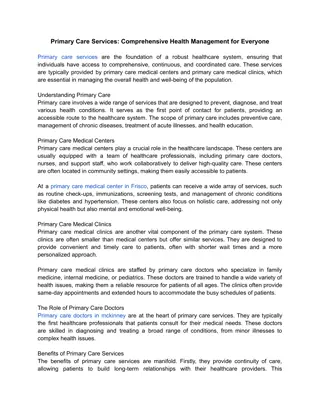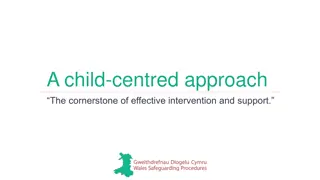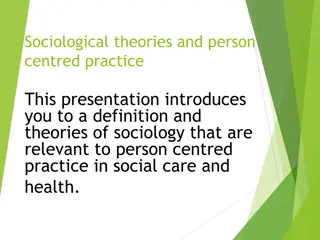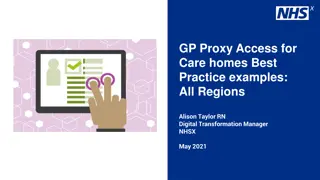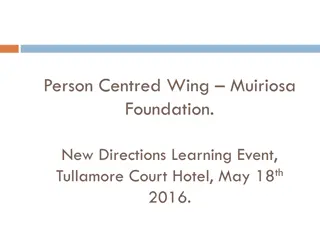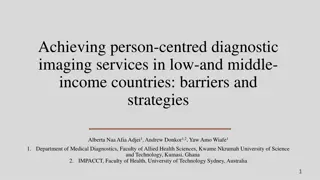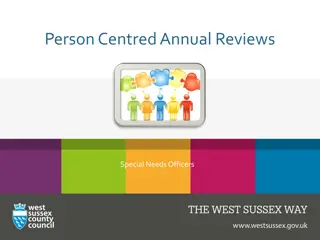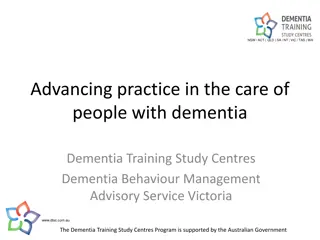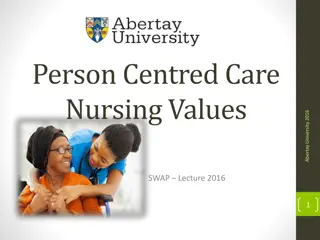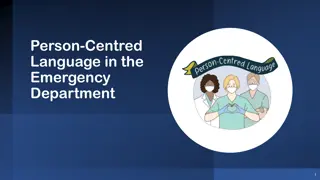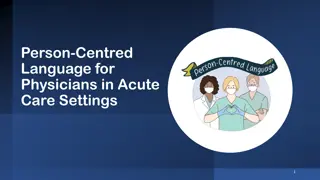Person-Centred Practice in Social Care and Health Services
This unit introduces learners to research, theories, models, legislation, regulation, and policy influencing person-centred practice in social care and health services. It explores the uniqueness of individuals, the importance of individualized care, and the theoretical background supporting person-centred approaches.
Download Presentation

Please find below an Image/Link to download the presentation.
The content on the website is provided AS IS for your information and personal use only. It may not be sold, licensed, or shared on other websites without obtaining consent from the author.If you encounter any issues during the download, it is possible that the publisher has removed the file from their server.
You are allowed to download the files provided on this website for personal or commercial use, subject to the condition that they are used lawfully. All files are the property of their respective owners.
The content on the website is provided AS IS for your information and personal use only. It may not be sold, licensed, or shared on other websites without obtaining consent from the author.
E N D
Presentation Transcript
Unit aim The aim of this unit is to introduce the learner to research, theories, models, legislation, regulation and policy that inform and influence the requirement to lead and manage person centred practice in social care and health services.
What is person centred practice ? Discussion: What words come to mind when you think about person centred practice? Why are we learning about person centred practice at the start of a leadership and management in social care and health award?
Social Care Wales Code of Professional Practice for Social Care (2017) definition of person centred working Approaches and ways of working that fully recognise the uniqueness of the individual and establish this as the basis for the planning and delivery of care.
Brooker (2007, p13) discussion of person centred care (practice) This is discussed in the context of dementia but the principles are applicable to any area of social care and health the VIPS model V Value base (principles and worth of something) which asserts the absolute value of human life regardless of age or cognitive (thought processes) ability I individualised approach recognising uniqueness
Brooker (2007, p13) discussion of person centred care (applicable to practice) P Understanding the world from the perspective of the individual accessing and using services S Providing a social environment that supports psychological needs (psychological mental and emotional)
Discussion How are we unique? Describe some of our characteristics and experiences that make us different.
Introduction to the theoretical context that underpins person centred practice A theory can be defined as an interpretation (understanding) of phenomena (experiences, events or happenings). Theories seek to generate an understanding of why or how something is experienced but they are not absolute (fixed) because they can be rejected or modified (adapted) (Teater, 2014; Parahoo, 2014). Context is the background, circumstance or framework of something.
Introduction to the theoretical context that underpins person centred practice Therefore a theoretical context is: The theories (and models) that influence our thinking on why and how person centred practice in social care and health should exist.
Introduction to the theoretical context that underpins person centred practice During this unit you will be introduced to: Biopsychosocial model PCS (Personal, Cultural, Social) model Functionalism Conflict theory Theory of the hierarchy of human need Development psychological perspective
Introduction to the legislative context that underpins person centred practice Legislation is the process of making laws (enforceable rules) and legislation is the collective term used for laws. The National Assembly for Wales is the democratically elected body that represents the interests of Wales and its people, makes laws for Wales, and holds the Welsh Government to account (National Assembly for Wales, 2017). Some law making is devolved (e.g. in relation health and social welfare) enabling the Welsh Government to make laws but other law making (e.g. welfare, benefits and social security) remain with the UK government. A context is the background, circumstance or framework of something.
Introduction to the legislative context that underpins person centred practice Therefore the legislative context is the legislation that directs our behaviour and determines our accountability in social care and health.
Introduction to the legislative context that underpins person centred practice During this unit you will gain knowledge on legislation such as: Welsh Language (Wales) Measure 2011 Human Rights Act 1998 Mental Capacity Act 2005 Equality Act 2010 Social Services and Well-being (Wales) Act Well-being of Future Generations (Wales) Act
Introduction to the policy context that underpins person centred practice Public policy is a set of decisions made by those with responsibility for an area of public life. These decisions influence people s actions, including organisations and individuals (Sykes, 2011). Public policy is often supported by relevant legislation. A context is the background, circumstance or framework of something.
Introduction to the policy context that underpins person centred practice Therefore a policy context is: Policies that influence our thinking and behaviour in relation to person centred practice in social care and health
Introduction to the policy context that underpins person centred practice During this unit you will gain knowledge of policies including: -Cymraeg 2050 Welsh language strategy - Social Services and Well-being (Wales) Act reference to preventative services, wellbeing and assessing the needs of individuals
You will become very familiar with Codes of Practice During this unit you will become very familiar with Codes of Practice and values (principles, thoughts and beliefs). Codes of Practice provide guidance on how legislation should be implemented as an inherent part of regulation (the process of enforcing laws). Values inform our approaches and behaviours.
Codes of Practice Social Care Wales Code of Professional Practice for Social Care https://socialcare.wales/landing-page/code-of-professional- practice-and-guidance?record-language-choice=en-cy NHS Code of Conduct for Healthcare Support Workers in Wales http://www.wales.nhs.uk/nhswalescodeofconductandcodeofpr actice Nursing and Midwifery Council (NMC) Prioritise People part of NMC Code https://www.nmc.org.uk/standards/code/read-the-code- online/#second
Codes of Practice The Social Care Manager; Practice Guidance for Social Care Managers registered with Social Care Wales https://socialcare.wales/cms_assets/file-uploads/SCW- SocCareMan-ENG-Mar19.pdf NHS Values and Standards of Behaviour Framework of the NHS website http://www.wales.nhs.uk/governance-emanual/values-and- standards-of-behaviour-framew
Discussion Having gained some understanding of what theory, legislation and policy is identify links between the three in terms of influencing person centred practice how might knowledge of theory, policy and practice influence your values and behaviours as a future manager and leader? Person centred practice Your future values and behaviours Legislation Theory Policy
References Brooker, D. (2007) Person-centred dementia care making services better. London;Philadelphia : Jessica Kingsley Publishers National Assembly for Wales (2017) Governance of Wales: Who is responsible for what? Available at: http://www.assembly.wales/en/abthome/role-of-assembly-how-it-works/Pages/governance-of-wales.aspx (Accessed: 4 September 2018). Parahoo, K. (2014) Nursing research: principles, process and issues. Basingstoke, Hampshire: Palgrave Macmillan. Sykes, S. (2011) Policy? What is it? How is it made? in Porter, E. and Coles, L. (eds). (2011) Policy and strategy for improving health and wellbeing. Exeter : Learning Matters, pp. 1- 20. Dawsonera [Online]. Available at: https://www.dawsonera.com(Accessed: 4 September 2018). Teater, B. (2014) An introduction to applying social work theories and methods. 2nd edn. Dawsonera [Online]. Available at: https://www.dawsonera.com (Accessed: 4 September 2018). You will find references for Codes of Conduct within your learning materials for this unit.


